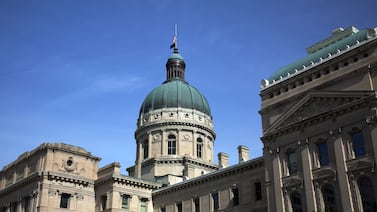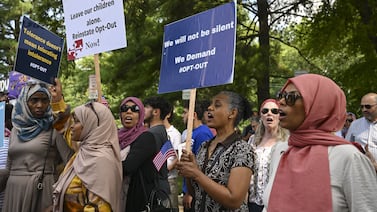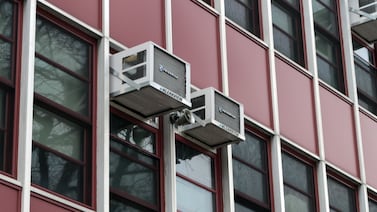This story was originally published on March 23 by THE CITY.
Reported COVID cases in New York City public schools rose rapidly in the last seven days, registering their biggest weekly gain since the peak of the omicron wave in January. The rise in school cases exceeded a general uptick in positive tests seen in some parts of Manhattan and Brooklyn in the past week.
The city Department of Education reported 1,422 infections in the seven-day period ending March 22, more than twice as many cases as reported in the seven-day period a month ago – while also marking the fourth consecutive weekly gain, DOE statistics show.
Average daily infections per 100,000 students for the week were 13.3 as of March 22, compared with the citywide incidence rate of 9.6 cases per 100,000 people.
Only a fraction of those positive tests came from DOE’s own in-school testing program of students whose parents have consented to periodic swabs, an effort some public health experts suggest is not worth the $30 million a month DOE spends on it.
And school cases detected by in-school testing are relatively rare: The seven-day positivity rate in that program is currently just 0.14%, versus the citywide average of 1.3%.
But still, the school numbers are rising. On Tuesday, the daily seven-day average of cases among students and staff of public schools was 203, compared with a seven-day average of 85 cases a month ago. Citywide, the seven-day average was 678 cases, versus an average of 1,034 a month ago.
The DOE “Situation Room” also centrally collects reports of positive student, teacher and staff coronavirus tests that arise from at-home kits as well as COVID testing centers around the city.
“A continuing concern is that there’s been a premature relaxation of many of these COVID-19 precautions because the pandemic is still happening right now,” said Bruce Y. Lee, professor of health policy at the CUNY Graduate School of Public Health.
Lee noted that it’s a challenge to “really know what the true positive might be,” with so many people testing at home in recent months.
But he underscored that broadly, with any type of respiratory virus, schools are “cauldrons for transmission” — because kids interact closely and spend a lot of time together. They then take those cases home to their families. In that way, the school testing system may be a glimpse of what’s to come among the general population.
“Schools tend to be high transmission areas for any type of respiratory virus. That would not be too surprising to see an upswing in cases occur subsequently elsewhere,” Lee said.
The uptick comes as Mayor Eric Adams announced this week that the city’s youngest students, below age 5, will not have to wear masks as of April 4. Masks became optional for the rest of the public school population two weeks ago, on March 7.
The prevalence of a new variant of COVID-19, dubbed B.A.2, is climbing, as well, according to recent data. It now makes up 42% of all COVID-19 cases in the state, state officials announced earlier this week.
“We have seen a more than 97% reduction in COVID cases since the peak of the omicron surge this year and students have been able to remain learning in-person and receiving the supports they need,” said DOE’s associate press secretary Jenna Lyle.
“We will continue to follow the science and adjust if needed, putting the health and safety of our students and staff first,” said Lyle.
The uptick is disappointing to Kaliris Salas-Ramirez, a newly appointed member of the citywide Panel for Educational Policy who has been vocal with COVID concerns as city schools moved back to in-person learning. She is a parent of two, including a fifth grader at an East Harlem public school.
“We relaxed all of the mitigation measures that we had. We’re not requiring vaccination in certain spaces, and we’ve lifted the masking mandates in all of our schools,” she said. “We’re seeing the results of taking away our protections.”
She feels lucky that her fifth-grade son’s school is supportive of kids who want to continue wearing masks; all of the teachers and paraprofessionals still wear them, she said.
“The majority of kids are still masking,” she said, but her son says “he feels unsafe when he has a lot of kids around him that are unmasked.”
Jesse Hackell, the head of the state American Academy of Pediatrics’ chapter that covers Manhattan, The Bronx and Staten Island, said that it is too soon to draw “too many conclusions from a week of data.” But, he said, if the schools sustains cases at the current level in the coming days, he hopes “the mayor would reconsider his decision about masks.”
“Although I am a little nervous about unmasking all the people, the mayor has a few weeks to see data and he can pull back,” Hackell added.
In the omicron variant wave in January, staffing shortages and low attendance plagued city schools while parents struggled to find child care amid the surge.
After hovering around 70% in late February, school attendance rates have improved as virus transmission slowed. The attendance rate hit 87% this week.
Vaccination rates for children under 18 remain low compared to the general population. Just 57% of 5- to 17-year-olds have received two doses of the COVID-19 vaccines as of March 22, according to city data. Among the 13-to-17 age group that is eligible to receive a booster shot, only 22% have taken the additional shot.
Overall, 78% of the city population has received two doses of vaccine, but just 36% have taken an additional dose.
The federal Centers for Disease Control and Prevention has said that children of age 6 months to 4 years “may soon” become eligible to receive COVID vaccine.
“Even though kids are at lower risk of severe outcomes, they can still have more severe outcomes, and there’s still a possibility that they may suffer from long COVID. On top of that, they can spread it to other people,” Lee said.
“We have to remember that all this, everything is connected.





